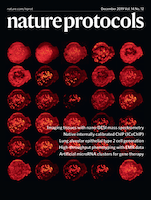
Nature Protocols
Scope & Guideline
Transforming Methodologies for Tomorrow's Research
Introduction
Aims and Scopes
- Methodological Innovations:
The journal emphasizes the publication of novel experimental techniques and methodologies that provide researchers with new tools to advance their work. - Interdisciplinary Approaches:
Nature Protocols promotes protocols that span multiple fields such as molecular biology, biochemistry, genetics, and bioengineering, reflecting the increasingly interdisciplinary nature of modern scientific research. - Focus on Reproducibility:
A core aim of the journal is to enhance reproducibility in research by providing comprehensive, step-by-step protocols that can be easily followed by other researchers. - Application-Driven Research:
The protocols published are often grounded in practical applications, addressing real-world problems in biology, medicine, and biotechnology. - Community Engagement:
Nature Protocols encourages contributions from the scientific community, fostering collaboration and sharing of knowledge among researchers worldwide.
Trending and Emerging
- CRISPR and Genome Editing:
Protocols related to CRISPR technology and genome editing are rapidly gaining traction, reflecting the growing interest in genetic manipulation for research and therapeutic applications. - Single-Cell Analysis Techniques:
There is a significant increase in protocols focusing on single-cell analysis, including single-cell RNA sequencing and proteomics, driven by the desire to understand cellular heterogeneity and complexity. - Microfluidics and Lab-on-a-Chip Technologies:
The rise of microfluidics and lab-on-a-chip technologies is evident, with many protocols emphasizing their applications in high-throughput screening, diagnostics, and precision medicine. - Organoid Models:
Emerging protocols for the generation and application of organoids highlight a trend towards more physiologically relevant models that better represent human tissues and diseases. - Data Integration and Bioinformatics:
There is an increasing focus on protocols that integrate data from various sources, including multi-omics approaches, driven by the need to analyze complex biological systems comprehensively.
Declining or Waning
- Traditional Methods:
There has been a noticeable decrease in the publication of protocols detailing traditional laboratory techniques, such as basic cell culture or simple biochemical assays, as researchers increasingly seek innovative and advanced methodologies. - Single-Use Protocols:
Protocols that are specific to single-use applications or limited experimental scopes are becoming less frequent, as there is a push for more versatile and reusable methodologies that can be applied across different experiments. - Focus on Well-Characterized Models:
Research that relies solely on well-characterized, established models (such as certain animal models) is declining as the field shifts towards more complex, physiologically relevant systems that better mimic human biology. - Basic Analytical Techniques:
The focus on basic analytical techniques, such as simple spectroscopic methods, has waned in favor of more sophisticated, high-throughput, and automated approaches that provide greater sensitivity and throughput.
Similar Journals

Nature Communications
Exploring the Frontiers of Biochemistry, Chemistry, and PhysicsNature Communications is a premier open-access journal published by NATURE PORTFOLIO, distinguished for its broad scope encompassing Biochemistry, Genetics and Molecular Biology, Chemistry, and Physics and Astronomy. With a remarkable impact factor, this journal has achieved Q1 status in multiple disciplines, reflecting its pivotal role in disseminating high-quality research. Since its establishment, it has provided a vital platform for innovative and interdisciplinary studies, fostering collaboration among scientists worldwide. Situated in the United Kingdom, it has rapidly gained recognition, ranking 7th in Global Physics and Astronomy and Biochemistry, as well as 16th in Chemistry according to Scopus metrics. Accessible since 2015, Nature Communications facilitates the sharing of groundbreaking ideas, making it an invaluable resource for researchers, professionals, and students aiming to stay at the forefront of scientific discovery.

Biology Methods & Protocols
Elevating experimental science with high-quality protocols.Biology Methods & Protocols is a pioneering open-access journal published by Oxford University Press, dedicated to advancing the field of biological research through the dissemination of cutting-edge methodologies and protocols. Since its inception in 2016, the journal has established a prominent presence in the academic community, achieving an impressive Q1 ranking in Agricultural and Biological Sciences (miscellaneous) and a Q2 ranking in Biochemistry, Genetics, and Molecular Biology (miscellaneous) as of 2023. With a Scopus rank that places it among the top 69% in its field, the journal serves as an essential resource for researchers, practitioners, and students seeking reliable and innovative techniques for their experiments. The publication not only promotes the sharing of high-quality protocols that can be readily adopted in laboratories globally but also encourages collaboration and knowledge sharing among scientists. Embracing an open-access model, Biology Methods & Protocols ensures that vital advancements in biological methodologies are accessible to all, thereby fostering a more inclusive scientific community.

Nature Reviews Methods Primers
Advancing biomedical research with essential methodological insights.Nature Reviews Methods Primers, published by SpringerNature, stands as a pivotal resource in the fields of biochemistry, genetics, molecular biology, and medicine, boasting an impressive impact factor indicative of its scholarly influence. This open-access journal, launched in 2021, aims to disseminate comprehensive, accessible overviews of innovative methodologies that can transform scientific research and clinical practices. With a remarkable Scopus rank of #7 out of 636 in General Medicine and a stellar #3 out of 221 in General Biochemistry, Genetics and Molecular Biology, it resides in the esteemed Q1 Quartile category for its contributions to academia. Researchers, professionals, and students will find Nature Reviews Methods Primers to be an invaluable tool as it bridges the gap between methodology and practical application, enabling advancement in a variety of biomedical fields.

MOLECULAR BIOLOGY OF THE CELL
Unraveling the Mysteries of Cell FunctionMOLECULAR BIOLOGY OF THE CELL is a prestigious journal published by the American Society for Cell Biology, focusing on the latest advancements in cell biology and molecular biology. Established in 1990, this journal serves as a vital forum for disseminating innovative research, methodologies, and insights that drive the understanding of cellular processes and their implications in health and disease. With a noteworthy impact factor and recognition within the top quartiles for both Cell Biology and Molecular Biology, it ranks prominently among its peers, with Scopus rankings reflecting its significance in the scientific community. Although the journal does not follow an open access model, it provides essential access options for both institutional and personal subscriptions. Researchers, professionals, and students seeking to expand their knowledge and collaborate on groundbreaking findings will find MOLECULAR BIOLOGY OF THE CELL an invaluable resource in the field.

Advances in Clinical and Experimental Medicine
Elevating Standards in Clinical ResearchWelcome to Advances in Clinical and Experimental Medicine, an esteemed publication by WROCLAW MEDICAL UNIVERSITY, dedicated to advancing the essential fields of clinical and experimental medicine. With an open access model since 2017, this journal ensures that researchers, healthcare professionals, and students worldwide can freely access high-quality scientific content. Covering a broad spectrum of topics including biochemistry, genetics, internal medicine, and pharmacology, Advances in Clinical and Experimental Medicine has established itself as a pivotal resource in the scientific community, currently holding prestigious rankings such as Q2 in Biochemistry, Genetics, and Molecular Biology (miscellaneous) and Q1 in Reviews and References (medical) for 2023. Spanning over two decades of rigorous research publication, the journal is a critical platform for sharing innovative findings and fostering collaboration among scholars, making it an invaluable asset for those at the forefront of medical science.

QUARTERLY REVIEWS OF BIOPHYSICS
Your gateway to high-impact biophysical discoveries.Quarterly Reviews of Biophysics, published by Cambridge University Press, is a premier academic journal dedicated to the field of biophysics. With an impressive impact factor reflecting its esteemed reputation, this journal occupies a distinguished position as evidenced by its Q1 category ranking in Biophysics and its ranking of #7 out of 152 in the Scopus database, placing it in the top 5% of its field. The journal has been a significant contributor to the scientific community since its inception in 1968, offering insightful reviews and analysis that bridge the disciplines of biochemistry, genetics, and molecular biology. Quarterly Reviews of Biophysics provides an invaluable platform for researchers, professionals, and students alike to access high-quality, peer-reviewed content that enhances understanding of molecular interactions and systems biology. While Open Access is not currently offered, the journal remains committed to disseminating critical knowledge to advance research and innovation in biophysics.

Jove-Journal of Visualized Experiments
Making Science Visible for EveryoneJove - Journal of Visualized Experiments, with ISSN 1940-087X, is a pioneering journal dedicated to publishing high-quality visualized research across a diverse array of scientific disciplines, including biochemistry, genetics, molecular biology, chemical engineering, immunology, microbiology, and neuroscience. Established in 2006 and published by the Journal of Visualized Experiments, this journal plays a crucial role in advancing research methodologies by allowing scientists to share their experimental procedures through visual means, thereby enhancing reproducibility and accessibility. With a Q2 classification in Chemical Engineering and several Q3 rankings in related fields as of 2023, Jove serves as a vital resource for researchers looking to disseminate complex experimental techniques clearly and effectively. Although the journal operates under traditional access models, it is committed to fostering an open exchange of knowledge, making it invaluable for students, professionals, and researchers eager to stay at the forefront of scientific innovation.

NATURE
Leading the Charge in Multidisciplinary ResearchNATURE, published by NATURE PORTFOLIO, stands as a premier academic journal in the field of multidisciplinary sciences, and has consistently ranked number one in its category, reflecting its influence and prestige with an impressive 99th percentile position among 171 journals in the Scopus rankings. With an illustrious history dating back to 1869, this journal serves as a critical platform for disseminating pioneering research and groundbreaking discoveries across a myriad of disciplines. While it maintains a traditional publishing model, NATURE's significance is underscored by its high impact factor, making it an essential resource for researchers, professionals, and students seeking to stay at the forefront of scientific advancements. The journal's headquarters are located in Berlin, Germany, and it continues to shape the scientific dialogue globally.

Molecular Biology Research Communications
Connecting researchers to elevate molecular science.Molecular Biology Research Communications is a distinguished academic journal published by Shiraz University, focusing on the critical and rapidly evolving fields of biochemistry and molecular biology. With an ISSN of 2322-181X and an E-ISSN of 2345-2005, this journal serves as an essential platform for researchers, professionals, and students to disseminate significant findings that contribute to the advancement of knowledge in these disciplines. The journal, operating from Shiraz, Iran, is notable for its contributions from both local and international scholars, offering invaluable insights and fostering scientific collaboration. Although currently indexed in the Q4 quartile across its categories, the journal aims to enhance its impact and visibility in the field as it converges years of research from 2017 to 2024. While the open access option is not available, the journal's commitment to high-quality peer-reviewed research provides a respected avenue for publication.

BULLETIN OF EXPERIMENTAL BIOLOGY AND MEDICINE
Advancing the Frontiers of Biological and Medical ResearchBULLETIN OF EXPERIMENTAL BIOLOGY AND MEDICINE is a prestigious journal published by SPRINGER, dedicated to advancing knowledge in the fields of biochemistry, genetics, molecular biology, and medicine. Established in 1956 and continuing to be relevant through to 2024, this journal provides a vital platform for researchers to publish original findings and significant reviews that contribute to these essential disciplines. With an ISSN of 0007-4888 and an E-ISSN of 1573-8221, it enjoys a respectable standing in the academic community, currently positioned in the Q3 quartile of both Biochemistry, Genetics and Molecular Biology, and Medicine categories for 2023. Despite its traditional subscription model, the journal reaches a wide audience of professionals, students, and researchers, who benefit from timely access to impactful research and experimental studies. By fostering a rich dialogue in experimental biology and medicine, this journal plays an important role in shaping ongoing research and understanding of complex biological systems.